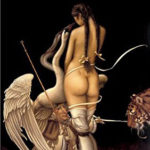This topic has 12 replies, 6 voices, and was last updated 8 years, 2 months ago by ![]() Melissa.
Melissa.
-
AuthorPosts
-
-
April 13, 2017 at 9:03 am #8099
 MelissaParticipant
MelissaParticipantI’ll add in a bit
-
April 13, 2017 at 9:08 am #8101
 MelissaParticipant
MelissaParticipantNotables:
1.) Michelangelo’s David
2.) “Love all, trust a few….the rest of that should be “do wrong to none.” Interesting that the last bit is left out.
3.) Shakespeare All’s Well That Ends Well….personally haven’t read this one so anybody with insight, I’d love to hear it!
-
April 13, 2017 at 9:11 am #8102
-
April 13, 2017 at 9:14 am #8103
 MeganParticipant
MeganParticipantAll’s Well kind of sucks. In 2001 I worked on a very small production of it in SF at Theatre Rhinoceros (which I believe is no longer there?) which was (groan) a bdsm-themed version of it. It starred one of the Sisters of Perpetual Indulgence and she stormed into the light booth one night to yell at me for missing a light cue.
But anyway.
It’s considered one of his problem plays, it’s not well loved, not produced often, not really a comedy. And…I think there’s a bed trick in it that could be construed as female rape? She gets the guy by getting herself pregnant off him while he thinks he’s fucking someone else. So, yay. REALLY problematic.
-
April 13, 2017 at 9:16 am #8104
Anonymous
InactiveWell “All’s Well That End’s Well” is one of the “problem” plays because it’s a muddled mix of comedy and tragedy. It is the play that includes the infamous “Bed trick”! Very controversial…
-
April 13, 2017 at 9:18 am #8106
Anonymous
Inactive@coryphella haha!! Literally posted at the same time! Yea, it’s really one of his worst in my opinion. Helena is just constantly chasing after a man who CLEARLY doesn’t want her and she just tricks him into sleeping with her and traps him into a life with her forever…but All’s Well That End’s well ??♀️??♀️
-
April 13, 2017 at 9:20 am #8107
 MelissaParticipant
MelissaParticipant^ exactly @macbethinabathtub
that or it’s Lust way of saying “ok love your community and confide with a few you trust….but back-stab to rise to the top all you want”. I mean, this is Lust and power grabs have been seen in play already with Sarah/Noah.
-
April 13, 2017 at 9:20 am #8108
 MeganParticipant
MeganParticipant@clairebuch – yeah I had to pause to go back to my husband, who’s the actual Shakespeare expert – I’m the non-narrative weird theater person in the house – and say “this is THAT play, right?” I could really go my entire life and never see another Shakespeare and not care one bit.
-
April 13, 2017 at 9:25 am #8109
 MikeParticipant
MikeParticipant@clairebuch said:
Helena is just constantly chasing after a man who CLEARLY doesn’t want her
What if Sarah is Helena? And if Noah is interested in @lilmsfancpants, then this could get interesting.
-
April 13, 2017 at 9:27 am #8110
 ChrisParticipant
ChrisParticipantAlso copy that to all concerned about All’s Well being one of Shakespeare’s worst. The quote in question is much less interesting in context– one of a paragraph of generic platitudes the Countess gives to her son on the first page as she bids him goodbye as he heads to his new job. The dialogue between Parolles and Helena equating maintaining virginity to warfare is slightly more entertaining, but probably not specifically relevant.
-
April 13, 2017 at 9:32 am #8111
Anonymous
InactiveSo @lilmsfancpants maybe Sarah is about to set Noah up for a “bed trick” of sorts…trying to trap him forever against his will!
What a tangled web we weave…
-
April 13, 2017 at 9:44 am #8115
 CristenParticipant
CristenParticipantDidn’t they leave out an important follow up line to the Oscar Wilde quote too if I’m not mistaken? Either they’re cherry picking what fits their model, or it thematically fits with the idea of finding a “missing piece” to something, which can change the whole meaning.
-
April 13, 2017 at 9:52 am #8118
 MelissaParticipant
MelissaParticipantI wanted to touch on the usage of Michelangelo’s David. The subject is from the Old Testament “David and Goliath”, right before he actually fights Goliath. David statue is pretty well known and symbolizes strength and young beauty (damn yesterday we had Dorian Gray who was at one point a good lookin’ lad, now David).
So….why David? In the story Goliath is a giant dude whereas David, normal human dude. Basically the tale of the underdog triumphs over all sorts of odds staked against him. Could this be alluding to the ‘losers’ becoming “winners”? Something else?
-
This reply was modified 8 years, 2 months ago by
 Melissa. Reason: trying be more accurate
Melissa. Reason: trying be more accurate
-
This reply was modified 8 years, 2 months ago by
-
-
AuthorPosts
You must be logged in to reply to this topic.


